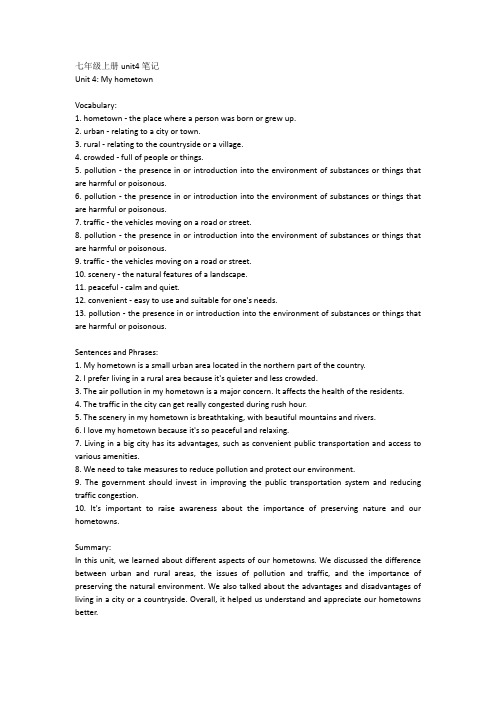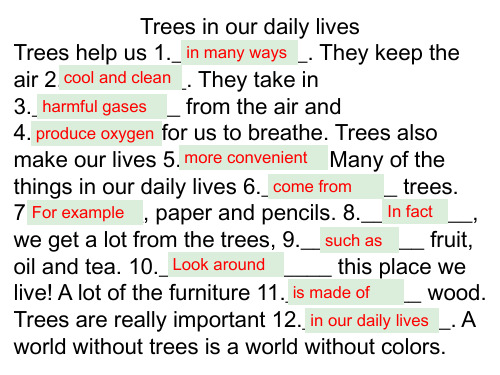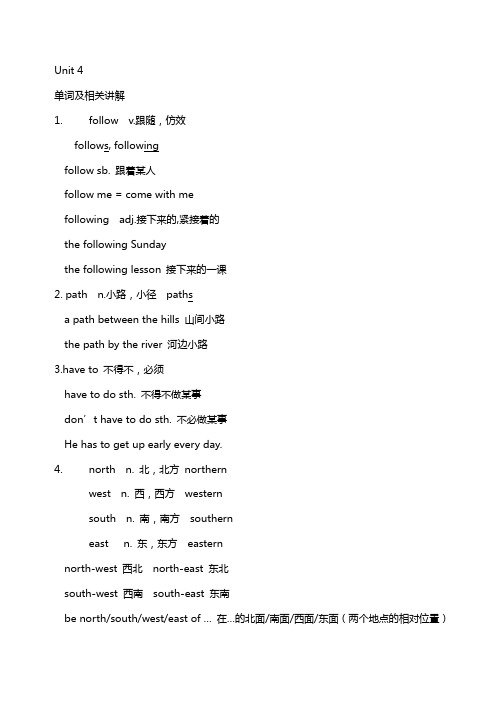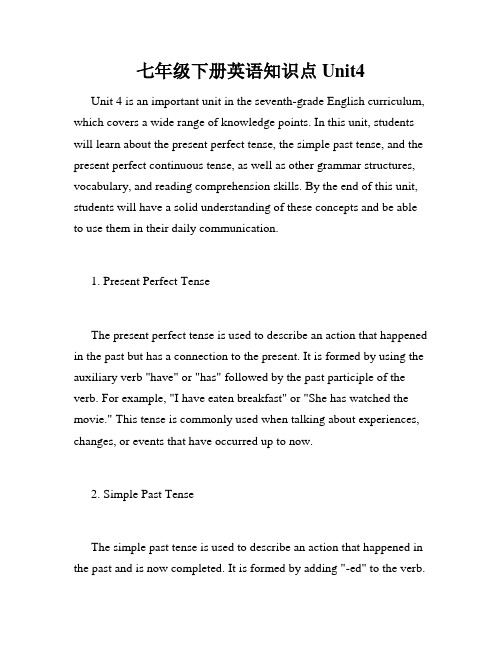广州版英语七年级Unit4 笔记
七上英语u4知识点总结

七上英语u4知识点总结Title: A Comprehensive Summary of Unit 4 in Seventh-Grade English.Unit 4 in seventh-grade English covers a wide range of topics, including daily routines, school life, and personal habits. This unit focuses on the language skills of listening, speaking, reading, and writing, while also introducing new vocabulary and grammar structures. In this article, we will provide a comprehensive summary of the key points covered in Unit 4.Vocabulary.The unit introduces a number of new vocabulary words related to daily activities and school life. Some key words include "go walking" (to take a walk), "too much homework" (excessive homework), "do morning exercises" (to perform morning stretches or exercises), "get up" (to wake up), "do after-school activities" (to participate in extracurricularactivities), "be late for school" (to arrive late at school), "start lessons" (to begin classes), and "be tidy" (to be neat and organized).Grammar.The grammar focus of Unit 4 is on the present simple tense and prepositions. Students learn to use the present simple tense to describe routine activities and habits.They also learn to use prepositions correctly in sentences, such as "on the sofa," "in the schoolbag," and "under the bed."Listening and Speaking.In the listening and speaking sections, studentspractice understanding and producing language related to daily routines and school life. They listen toconversations and stories about school activities, routines, and habits, and then practice speaking about their own routines and activities. This helps them develop their listening comprehension and speaking skills.Reading.The reading section introduces students to different types of texts, including stories, dialogues, and instructions. These texts are designed to help students understand and extract information about daily routines, school life, and personal habits. Students learn to skim and scan texts to find specific information and understand the main ideas.Writing.The writing section focuses on writing about daily routines and activities. Students are introduced to different types of writing tasks, such as writing about their own routines, describing a picture of a school day, and writing instructions for a task. This helps them develop their writing skills and ability to express ideas clearly and coherently.In conclusion, Unit 4 in seventh-grade English covers avariety of topics related to daily routines, school life, and personal habits. It focuses on vocabulary, grammar, listening, speaking, reading, and writing skills. By practicing these skills through different types ofactivities and texts, students can improve their English language proficiency and apply what they learn to real-life situations.。
七年级上册unit4笔记

七年级上册unit4笔记Unit 4: My hometownVocabulary:1. hometown - the place where a person was born or grew up.2. urban - relating to a city or town.3. rural - relating to the countryside or a village.4. crowded - full of people or things.5. pollution - the presence in or introduction into the environment of substances or things that are harmful or poisonous.6. pollution - the presence in or introduction into the environment of substances or things that are harmful or poisonous.7. traffic - the vehicles moving on a road or street.8. pollution - the presence in or introduction into the environment of substances or things that are harmful or poisonous.9. traffic - the vehicles moving on a road or street.10. scenery - the natural features of a landscape.11. peaceful - calm and quiet.12. convenient - easy to use and suitable for one's needs.13. pollution - the presence in or introduction into the environment of substances or things that are harmful or poisonous.Sentences and Phrases:1. My hometown is a small urban area located in the northern part of the country.2. I prefer living in a rural area because it's quieter and less crowded.3. The air pollution in my hometown is a major concern. It affects the health of the residents.4. The traffic in the city can get really congested during rush hour.5. The scenery in my hometown is breathtaking, with beautiful mountains and rivers.6. I love my hometown because it's so peaceful and relaxing.7. Living in a big city has its advantages, such as convenient public transportation and access to various amenities.8. We need to take measures to reduce pollution and protect our environment.9. The government should invest in improving the public transportation system and reducing traffic congestion.10. It's important to raise awareness about the importance of preserving nature and our hometowns.Summary:In this unit, we learned about different aspects of our hometowns. We discussed the difference between urban and rural areas, the issues of pollution and traffic, and the importance of preserving the natural environment. We also talked about the advantages and disadvantages of living in a city or a countryside. Overall, it helped us understand and appreciate our hometowns better.。
七年级上册unit4重点词汇和短语

一、单词汉译英1.n.诗_______________2.n.成员_______________3.n.野餐_______________4.n.沙拉_______________5.n.曲奇饼_______________6.n.天;天空_______________7.n.谜;谜语_______________8.n.礼物;礼品_______________9.n.玫瑰花;蔷薇花_______________10.n.秘密;诀窍;奥妙_______________11.n.祖父;祖母;外祖父;外祖母_______________12.pron.一切_______________13.pron.某物;某事_______________14.adj.英俊的_______________15.adj.准备好的_______________16.adj.特别的;特殊的_______________17.adj.微小的;极小的_______________18.adj.软的;细滑的;柔和的_______________19.adv.终于;最终_______________20.adv.去别处;离开_______________21.v.偷;窃取_______________22.n.&v.结束;末端_______________23.n.封皮;覆盖物v.遮盖;覆盖_______________24.v.用颜料画n.油漆;绘画颜料_______________25.v.笑;大笑n.笑声_______________26.v.指向;瞄准n.要点;观点_______________二、根据提示写单词1.n.女士 _______________→(复数) _______________2.n.三明治 _______________→(复数) _______________3.v.放置;设置_______________→(现在分词) _______________4.v&n微笑;笑_______________→(现在分词) _______________三、短语汉译英1.种花_______________2.注意_______________3.跳出来_______________4.去户外_______________5.去野餐_______________6.长是语_______________7.在湖边_______________8.在那边_______________9.摆餐具_______________10.玩得开心_______________11.指向……_______________12.转身离开_______________13.走过;路过_______________14.在……最后_______________15.把……放在……上_______________16.愿意做……;准备做……_______________Nouns名词&Pronouns代词Adjectives &Adverbs形容词和副词Others其他一、方框选词组look out, look out of, look for,look up, look like, look at1.___________,Betty!A dog is coming.2. Susan is very beautiful. She ___________ a film star.3. I ___________ my key everywhere,but I still can’t find it.4. She often ___________ new words in the dictionary.5. ___________ the picture. Can you see the cat?6. Be careful!The milk is so hot!(同义句转换)________________!The milk is so hot!7. 看看窗外,多么美好的春天呀!(汉译英)________________________the window. How nice the spring is!8. She’s very good at taking care of herself.(同义句转换)She’s very good at ________________herself.二、用something、anything、everything或nothing的适当形式填空1. ________ is covered with(被……覆盖)snow after the snow.2. Come on,everybody. I have ________ important to tell you.3. —Can you do ________ special for me?— Sure. What is it?4. —How do you like your life in Grade7?—It was a little difficult at first,but ________ is fine now.5. We didn’t find ________ in the box.6. I look out of the window but I see ________ .7. Parents give ________ to teenagers but want nothing in return(作为回报).三、用wish或hope的适当形式填空1. They ________ to win the basketball match.2. I want to give you all my best ________ .3. May all your ________ come true. Have a wonderful day.4. I ________ your birthday is like you,special and wonderful.5. Your mother ________ you to be happy every day.6. His grandpa ________ to give him a special gift.四、重点介词to,for,with,by 的用法1. She always gives help ________ others.2. I have some cookies ________ Rover.3. We are walking ________ the lake.4. Today is our family’s picnic day. Rover is ________ us.5. I usually go to school ________ bus.6. I eat breakfast ________ my family.7. I buy a gift ________ my mother.8. He is writing a letter ________ his pen pal.Unit 3易错考点专练考点1【易错点津】hear通常是及物动词,后面可以直接跟宾语,含义是“听到”,强调听的结果,hear of/about听说,hear from sb.收到某人来信;listen是不及物动词,含义是“听”,后面不能直接跟宾语,强调听的动作,常用短语listen to。
广州深圳版英语-七下-unit4-save-the-trees-writing复习课程

Unit 4 Save the trees
Preparation (准备) before class
•Textbook •Pink book •Writing book •Notebook •Pens
Aims of the lesson
• 综合《学评》和周报上的写作题,整 理本单元以“树木”为主题的写作素材, 并进行限时写作。
5. 对......有好处 _b__e_g_o_o_d__f_or
6. 对.......有帮助 _b_e__h_e_lp_f_u_l_to 7. 使空气保持洁净 __k_e_e_p_t_h_e_air clean
8. 尽力做某事 _tr_y__to__d_o__s_th_./ try one's best
Trees in our daily lives Trees help us 1.__in_m_a_n_y_w_a_ys__. They keep the air 2._co_o_l a_n_d_c_le_a_n _. They take in 3._h_a_rm_f_u_l g_a_se_s___ from the air and 4._p_ro_d_uc_e_o_xy_g_e_n for us to breathe. Trees also make our lives 5._m_o_re_c_o_nv_e_n_ie_nt_. Many of the things in our daily lives 6._c_o_m_e_f_ro_m____ trees. 7.F_o_r_e_xa_m_p_le__, paper and pencils. 8.___In_fa_c_t ___, we get a lot from the trees, 9.__s_u_c_h _as____ fruit, oil and tea. 10.__Lo_o_k_a_ro_u_nd______ this place we live! A lot of the furniture 11._is_m__ad_e_o_f ____ wood. Trees are really important 12._in__ou_r_d_ai_ly_li_ve_s__. A world without trees is a world without colors.
七年级下Unit4课堂笔记

Unit 4单词及相关讲解1.follow v.跟随,仿效follows, followingfollow sb. 跟着某人follow me = come with mefollowing adj.接下来的,紧接着的the following Sundaythe following lesson 接下来的一课2. path n.小路,小径pathsa path between the hills 山间小路the path by the river 河边小路3.have to 不得不,必须have to do sth. 不得不做某事don’t have to do sth. 不必做某事He has to get up early every day.4.north n. 北,北方northernwest n. 西,西方westernsouth n. 南,南方southerneast n. 东,东方easternnorth-west 西北north-east 东北south-west 西南south-east 东南be north/south/west/east of …在…的北面/南面/西面/东面(两个地点的相对位置)The zoo is north of our school. 动物园在我们学校的北面。
区别be in the north/south/west/east of …在…的北部/南部/西部/东部(一个地点在另一个地点内部的位置)Beijing is in the north of China. 北京在中国的北部。
另外:be to the north of …类似be north of …,指在…以北,一般相邻Russia is to the north of China.例子:无锡东邻上海。
Wuxi is west of Shanghai.上海东临大海。
Shanghai is west of the sea.台湾在中国南部。
七年级下册英语知识点Unit4

七年级下册英语知识点Unit4 Unit 4 is an important unit in the seventh-grade English curriculum, which covers a wide range of knowledge points. In this unit, students will learn about the present perfect tense, the simple past tense, and the present perfect continuous tense, as well as other grammar structures, vocabulary, and reading comprehension skills. By the end of this unit, students will have a solid understanding of these concepts and be able to use them in their daily communication.1. Present Perfect TenseThe present perfect tense is used to describe an action that happened in the past but has a connection to the present. It is formed by using the auxiliary verb "have" or "has" followed by the past participle of the verb. For example, "I have eaten breakfast" or "She has watched the movie." This tense is commonly used when talking about experiences, changes, or events that have occurred up to now.2. Simple Past TenseThe simple past tense is used to describe an action that happened in the past and is now completed. It is formed by adding "-ed" to the verb.For example, "I walked to school" or "He played soccer yesterday." This tense is used to talk about a specific time in the past, and when the time or date is important to the story.3. Present Perfect Continuous TenseThe present perfect continuous tense is used to describe an action that started in the past and continues up to the present. It is formed by using the auxiliary verb "have" or "has" followed by "been" and the present participle of the verb. For example, "I have been learning English for three years" or "She has been studying hard for her exams." This tense is used to emphasize the ongoing nature of the action and its relevance to the present.4. VocabularyIn this unit, students will learn a variety of new vocabulary words related to travel, vacation, and leisure activities. These words include "destination," "backpack," "tourist attraction," "surfing," and "skiing." By mastering these words, students will be able to talk about their interests, plans, and experiences in English more fluently.5. Reading ComprehensionThroughout this unit, students will have the opportunity to practice their reading comprehension skills by reading passages related to travel, vacation, and leisure activities. They will be asked to identify the main idea, make inferences, and summarize the text. These skills are essential for academic success in English and will help students develop critical thinking and analytical abilities.Overall, Unit 4 is a crucial unit in the seventh-grade English curriculum. By mastering the grammar structures, vocabulary, and reading comprehension skills presented in this unit, students will be well-prepared for future academic and professional success in English.。
七下英语unit4笔记
七下英语unit4笔记Notes for Unit 4 of Grade 7 English.Topic: School Life.Section A: School Subjects.1. Vocabulary.Subjects: Math, English, Chinese, Science, History, Geography, PE, Music, Art, Computer Science.Expressions related to subjects: My favorite subject is English. I like science because it's interesting. Idon't like math, it's too difficult.2. Grammar.Using "have" and "has" with subjects: I have a science test tomorrow. He has a music lesson on Fridays.Expressing preferences: My favorite subject is (I)like... because.... I don't like... because....3. Sentences.What's your favorite subject? My favorite subject is English.Why do you like science? Because it's interesting.When do you have your PE class? We have PE on Tuesdays and Thursdays.Section B: School Schedules.1. Vocabulary.Times of the day: morning, afternoon, evening.Activities: classes, lunch, recess, homework.2. Grammar.Using the present tense for routines: I get up at 6 am every day. She has lunch at 12 pm.Describing daily activities: After school, I usually do my homework. On weekends, we often go to the park.3. Sentences.What time do you get up? I get up at 7 am.What do you do after school? I usually play basketball with my friends.What's your favorite activity after school? Myfavorite activity is reading books in the library.Section C: School Rules.1. Vocabulary.Rules: Don't arrive late, Don't eat in class, Keep quiet in the library.Consequences: Get a detention, lose recess, write a reflection.2. Grammar.Using modal verbs for rules: You must arrive on time. You can't bring food to class.Describing consequences: If you arrive late, you'll get a detention. If you don't do your homework, you'll lose recess.3. Sentences.What are the school rules? We must wear our school uniforms every day.What happens if you break a rule? If you break a rule, you'll have to write a reflection.How can we follow the rules? We can remind each other and help each other follow the rules.Section D: Extra-Curricular Activities.1. Vocabulary.Activities: Clubs, sports, competitions, performances.Expressions: Join a club, try out for a team, participate in a competition.2. Grammar.Using "join" and "try out" for activities: I want to join the music club. He tried out for the basketball team.Describing experiences: I participated in the science competition last year. It was really exciting!3. Sentences.What extra-curricular activities do you participate in?I participate in the chess club every week.How often do you do these activities? I do them twicea week, on Tuesdays and Thursdays.What's the most memorable experience you've had? The most memorable experience was when we won the school basketball championship last year.Section E: School Trips.1. Vocabulary.Places: Museums, zoos, science centers, historical sites.Expressions: Go on a school trip, visit a place, learn about history/science.2. Grammar.Using the past tense for school trips: We went to the museum last week. They visited the science center yesterday.Describing experiences: It was really interesting! We learned a lot about animals.3. Sentences.Where did you go for your school trip? We went to the zoo to see different animals.What did you learn? We learned about the different habitats of animals and their behavior patterns.Was it fun? Yes, it was a lot of fun! We had a great time learning and exploring.Revision and Conclusion.This unit covers a wide range of topics related to school life, including subjects, schedules, rules, extra-curricular activities, and school trips. It's important to revise and practice the vocabulary, grammar, and sentences related to these topics to improve your understanding and fluency in English. Remember to use the language you've learned in real-life situations and conversations to make your learning more meaningful and enjoyable.。
七年级英语unit4上册知识点
七年级英语unit4上册知识点Unit 4 Knowledge Points for Seventh-Grade EnglishUnit 4 of the seventh-grade English textbook introduces students to a wide range of topics. It covers everything from describing daily routines to discussing plans for the future. In this article, we will provide an overview of the key knowledge points covered in Unit 4.1. Present Simple Tense for Daily RoutinesThe present simple tense is used to describe actions that happen regularly or are true all the time. In Unit 4, students learn how to use this tense to talk about their daily routines. This includes discussing things like when they get up, what they eat for breakfast, and how they travel to school.Example: "I usually wake up at 6:30am, brush my teeth, and eat breakfast before leaving for school at 7:30am."2. Adverbs of FrequencyIn addition to learning the present simple tense, students also learn how to use adverbs of frequency to describe how often they do things. These adverbs are placed before the main verb, and include words like "always," "often," "sometimes," and "never".Example: "I always eat breakfast before school."3. Comparatives and SuperlativesComparatives and superlatives are used to compare two or more things. In Unit 4, students learn how to use these forms of adjectives to compare different activities. This includes discussing things like which sport is more popular, or which subject is the most difficult.Example: "Playing soccer is more popular than playing basketball."4. Future PlansUnit 4 also includes a section about discussing future plans. Students learn how to talk about their future goals, and how to use the simple present tense to describe future events that are scheduled to happen.Example: "I plan to go to college after I finish high school."5. Invitations and RequestsFinally, Unit 4 covers how to make invitations and requests in English. Students learn how to use polite language to ask for things, and how to make polite invitations to social events.Example: "Would you like to come to my party on Saturday?"In conclusion, the knowledge points covered in Unit 4 of the seventh-grade English textbook are varied and useful. By learning about things like present simple tense, adverbs of frequency, comparatives and superlatives, future plans, and invitations and requests, students will be well-equipped to speak and write confidently in English.。
广州英语七年级第二学期unit1-4知识梳理 (1)
百度文库- 让每个人平等地提升自我!七年级第二学期(Unit 1~Unit 4)基础自测一、词汇拓展1.central(adj.)→_________(n.)中心2.relax(v.)→__________(adj.)让人放松的→_________(adj.)(人)感到放松的3.limited(adj.)→_________(v.)限制→_________(n.)限制,限度4.interview(v.)→_________(n.)采访→_________(n.)采访者5.danger(n.)→_________(adj.)危险的→_________(adj.)(反义词)安全的6.reason(n.)→_________(adj.)合理的7.describe(v.)→_________(n.)描述8.disability(n.)→_________(adj.)残疾的,丧失能力的9.seriously(adv.)→_________(adj.)严重的10.explanation(n.)→_________(v.)解释;说明11.careful(adj.)→_________(adj.)(反义词)粗心的12.imagine(v.)→_________(n.)想象;设想二、短语归纳1.如今;而今2.黄昏后;天黑后3.出国_______________________4.砍掉____________________________5.关心_______________________6.出现_____________________________7.不少;相当多8.在某种程度上_____________________9.确保10.关掉(开关)____________________11.take part in ... 12.from place to placemunicate with____________ 14.do one’s best to... _________15.stop ... from doing ... _______ 16.in one’s opinion___________17.be connected to_____________ 18.on the safe side___________19.answer the telephone___________ 20.lean out of___________要点聚焦一、词汇精讲1.send n. 文化课文:When we go abroad on holiday, we often send postcards to our friends at home.当出国度假时,我们经常给国内的朋友们寄明信片。
七年级英语下册Unit4Don'teatinclass知识点总结(超全)(带答案)
七年级英语下册Unit4Don'teatinclass知识点总结(超全)单选题1、—Must I leave now? It's still raining hard outside.—No, you ________. You can wait till the rain stops.A.don't have toB.couldn'tC.can'tD.shouldn't答案:A句意:-我必须现在离开吗?外面还在下着大雨。
-不,你不必,你可以等到雨停。
don’t have to不必,没有必要;couldn’t不能,是can的过去式;can’t不能;shouldn’t不应该。
一般疑问句中用的是must,否定回答应用needn’t或者是don’t have to。
故选A。
2、Jack, ________, or you will get heavier.A.doesn’t play sports any moreB.doesn’t eat so much meatC.don’t play sports any moreD.don’t eat so much meat答案:D句意:Jack,不要吃太多肉,否则你会变得更胖的。
考查否定祈使句。
否定祈使句应以“don’t”开头,排除A和B,由空后的“or you will get heavier”可知,应该是“不要吃如此多的肉”,排除C,故选D。
3、—Next week I'll join in the oral English competition.—________A.Have a nice day!B.No problem!C.Good luck to you!D.Not too bad!答案:C句意:——下周我将参加英语口语比赛。
——祝你好运。
A. Have a nice day! 祝你度过愉快的一天;B. No problem! 没问题;C. Good luck to you! 祝你好运;D. Not too bad! 不是太糟糕。
- 1、下载文档前请自行甄别文档内容的完整性,平台不提供额外的编辑、内容补充、找答案等附加服务。
- 2、"仅部分预览"的文档,不可在线预览部分如存在完整性等问题,可反馈申请退款(可完整预览的文档不适用该条件!)。
- 3、如文档侵犯您的权益,请联系客服反馈,我们会尽快为您处理(人工客服工作时间:9:00-18:30)。
(7下)Unit4 复习笔记
1.daily life 日常生活:
Trees are very important in our daily lives.在我们的日常生活中,树很重要。
2.in many ways 以很多方式/ 在很多方面
Trees help us in many ways. 树以很多方式帮助我们。
3.keep 保持keep sth./ sb. +adj. 使……保持……的状态
Trees keep the air cool and clean. 树使空气清新干净。
We should _____ our classroom ________. 我们应当保持教室清洁。
___________________________________. 我们应当保持房间干净。
keep doing sth. 继续做某事:He kept working all day.
4.take in吸收:Trees take in harmful gases. 树木吸收有害气体。
The root ________ water from the earth. 树根从土壤中吸收水分。
5.make sth/ sb + adj. 使……怎么样;make + V原
Trees make our lives more convenient. 树使我们的生活更方便。
______________________________________. Nolan 总是令我们开心。
_____________________________________. 他总是让我们哈哈大笑。
e from = be from 来自于
Many things come from trees. = Many things are from trees.
Tea _________ the leaves of trees. = Tea _________ the leaves of trees.
- __________________? 你来自哪?-____________________ 我来自花都。
7.for example +逗号+句子:I like eating fruits. For example,I like apples.
such as+名词/ V-ing:I like eating fruits, such as apples, oranges and bananas.
I have a lot of hobbies, ________, I like swimming very much.
I have a lot of hobbies, ________ swimming, reading and singing.
8.in fact 事实上look around 环顾四周
He heard some noise and ____________, but ________ he can’t find anything.
他听到一些声音就到处看看,但事实上他什么也没发现。
9.get……from……从……中获得……
We get a lot from trees,for example,we can______ fruit _______ them.
我们从树上获得很多, 比如,我们可以从中收获水果。
10.stop doing sth. 停止做某事:
We should stop doing this. 我们应当停止做这件事情。
______ ________! = Shut up!别说话!
We must ______ _______ down trees. 我们必须停止砍树。
11.be made of 由……制成(看得出原材料):The furniture is made of wood.
The pencil ________________ wood. 铅笔是用树木做的。
The flower ________________ glass. 这朵花是玻璃做的。
be made from 由……制成(看不出原材料):
The paper ________________trees. 纸是树木做的。
12.cut down 砍伐millions of 大量的/数以百万计的
We cut down millions of trees every year. 每年我们砍伐了大量的树。
_______________________________________.每年数百万人来广州游玩。
13. be good for 对……有好处,be bad for 对……有害处= be harmful to
Doing sports are good for our health. Harmful gases are bad for our health.
_____________________________________. 读书对我们有益。
_____________________________________. 抽烟有害健康。
14.What do trees do for us? 树为我们做了些什么?
They help fight against pollution. 他们帮助防御污染。
They provide us with wood, fruit and so on.他们为我们提供树木,水果等等。
They are homes to birds and animals.他们是树和动物的家园。
15.I can’t imagine a world without trees. 我无法想象没有树的世界。
Can you _________ your life ________ paper?你能想象没有纸的生活吗?
16.do our best to 尽我们最大的努力
We must do our best to protect trees. 我们必须尽我们最大的努力保护树木。
___________________________________. 我们应当尽力帮助有困难的人。
17.fight against 与……作斗争fight for 为……而战
We should fight against bad people. 我们应当与坏人作斗争。
against反对
I will fight for my dreams. 我将为梦想作斗争。
for 支持
18. 现在进行时的用法:表示现在或者现阶段正在进行的动作
陈述句结构:主语+am / are / is + V-ing;
疑问句结构:am/ are/ is + 主语+ V-ing?
___________________ 你现在在做什么?__________________我正在看电视。
___________________ 你妈妈正在煮饭吗?___________________是的。
Look! They ______________ trees there. (plant)
Listen! She _______________ about you. ( talk ).。
